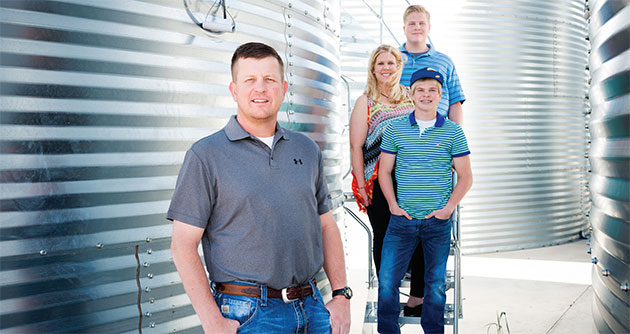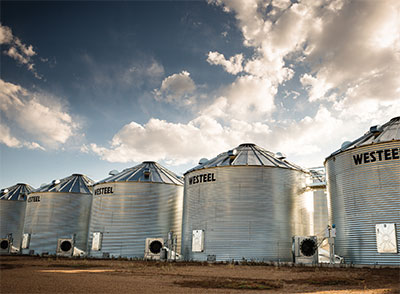
Justin Crownover, foreground, and his wife, Stephanie, and sons Cole, top, and Connor are part of the team at Lone Star Family Farms.
Photo by Shannon Richardson
At Lone Star Family Farms, owned by the Crownover family outside of Sunray, Texas, steel grain bins glisten in the brilliant Texas Panhandle sun, some holding last year's crop, others waiting for this year's. Not just two or three bins, but 32 grain bins in total, these giant canisters represent the family's faith in the future of agriculture.
One might assume that the bins, with their combined capacity of 416,000 million bushels, also represent a huge outlay of capital. But in fact Lone Star Family Farms was able to erect the 32 bins without financing or purchasing them outright — thanks to Farm Credit Leasing solutions provided by their lender, AgTexas Farm Credit.
"Primarily for income tax reasons, we chose to lease rather than purchase the bins," says Johnny Schmucker, the farming operation's chief financial officer. "Tax rules have been favorable for purchases, but leasing allows us to deduct the entire annual lease payment, which lowers our taxable farm income, and that's significant to us."
The storage bins were leased on a 10-year program, with a buyout option at the end of the lease term.
Over 30,000 Acres of Crops
A diversified grain production farm, Lone Star Family Farms was started in 2009 when K Crownover and her sons and their wives, Justin and Stephanie, and Adam and Rebecca, combined their three separate farming units into one. After Adam died in a tragic ATV accident five months later, his uncle and aunt, Donald and Nita Crownover, and the farm's irrigation mechanic and his wife, Conan and Lee Ann Cassidy, also joined the partnership.
Today, the business grows more than 30,000 acres of wheat, feed milo, seed milo, seed canola, triticale, cotton, yellow corn, food-grade white corn, and non-GMO varieties of food-grade white and yellow corn — and after harvest, all of those crops must be trucked to their various markets or put into storage.
"We put the bins up because we produce a lot of seed milo, and harvest becomes much more timely and efficient if we can store the grain here during harvest and not have to tie up trucks delivering it to the seed company located 100 miles away," Schmucker explains.
Priced from $40,000 to several million dollars each, depending on size and design, grain storage facilities are a popular lease item, according to Joe Kendrick, relationship manager with Farm Credit Leasing. Center-pivot irrigation units — which the Crownovers have leased on seven-year terms — tractors, feed trucks, pickups, loaders and farm storage buildings are other types of equipment commonly leased by West Texas farmers and feedlot operators, Kendrick reports. He has even leased turnkey office facilities for agribusiness operations.
Benefits of Leasing
Brad Thacker, vice president of lending with AgTexas Farm Credit in Amarillo, cites tax reduction, cash flow and fleet management as the main reasons Farm Credit customers opt for leasing. In addition, some customers prefer to lease their equipment in order to treat it as an operating expense rather than an asset on the balance sheet, or to preserve their working capital.
"Leasing is one more product that allows Farm Credit to better serve our customers."
– Brad Thacker
"Leasing is one more product that allows Farm Credit to better serve our customers," says Thacker. "We don't promote leasing to replace loans; but for those customers who have determined that it's the right financial tool, we can make it easy for them, if we already have their operating loans and financial profile."
Credit approval and paperwork typically take 24 to 48 hours for small transactions and about a week for large transactions.
Leasing has been offered by some Farm Credit lending associations across the country — but not all — since it was permitted under Farm Credit legislation in the 1970s.
"Farm Credit is in the relationship business," says Kendrick, "so our goal is to make it very easy for the customer to acquire the asset they need at a competitive cost."
– Staff

Lone Star Family Farms opted to lease rather than purchase these grain bins to take advantage of tax savings.
Why Lease?
- Pay Nothing Down
Typically, down payments aren't necessary. Simply pay the first payment in advance. Often, leasing can provide 100 percent financing. - Maximize Tax Benefits
Lease payments may be fully tax deductible under a true lease, allowing you to lower your taxable income and expense the equipment sooner. A conditional sale allows you to take advantage of deductions available as tax owner of the equipment. - Control Your Cash Flow
Fixed rates, residual value and flexible payment schedules allow you to match your payments to your cash flow and the profits generated by the leased equipment. - Preserve Capital
By leasing, you preserve your cash, working capital and other credit lines for expansion and day-to-day expenses. - Standardize Your Replacement Cycle
With lease financing, you can replace equipment regularly and rest assured that you have reliable, low-maintenance equipment at all times. - Retain Future Flexibility
When your lease ends, you decide if you want to purchase and continue using the equipment or return it and get a newer model. - Estate Planning Tool
Leasing allows you a simple way to transition equipment to the next generation at the end of the lease term.